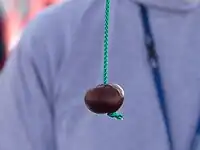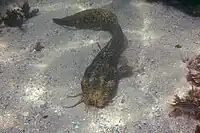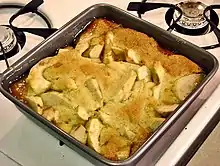cobbler
English
Pronunciation

- (Received Pronunciation) IPA(key): /ˈkɒblə/, /ˈkɒbələ/
- (General American) IPA(key): /ˈkɑblɚ/, /ˈkɑbəlɚ/
Audio (GA, two syllables) (file) Audio (GA, three syllables) (file) - Rhymes: (Received Pronunciation) -ɒblə, (General American) -ɑblə(ɹ)
- Hyphenation: cob‧bler
Etymology 1
From Middle English cobeler, cobelere (“mender of shoes, cobbler”) [and other forms];[1] further origin unknown. The word appears to be derived from an early form of cobble (“to mend roughly, patch; (specifically) to mend shoes, especially roughly”) + -er (suffix forming agent nouns), but is attested much earlier than the verb which suggests that the verb may be a back-formation from cobbler.[2][3]
Sense 2 (“sheep left to the end to be sheared”) is a pun on cobbler’s last (“tool for shaping or preserving the shape of shoes”);[2] while sense 3 (“clumsy workman”) is derived from cobble + -er: see above.
Noun
cobbler (plural cobblers)
- A person who repairs, and sometimes makes, shoes.
- Synonyms: (obsolete, one sense) botcher, (India, archaic) chuckler, (Britain, slang, obsolete) lad of wax, shoemender, (Northern England, Scotland) souter, (Ireland, dated) waxie, (Britain, slang, obsolete) waxy
- 1647, Jerome Bellamie, “Postscript”, in Theodore de la Guard [pseudonym; Nathaniel Ward], The Simple Cobler of Aggawam in America. […], London: […] J[ohn] D[ever] & R[obert] I[bbitson] for Stephen Bowtell, […], →OCLC; The Simple Cobler of Aggawam in America (Force’s Collection of Historical Tracts; vol. III, no. 8), 5th edition, Boston, Mass.: […] Daniel Henchman, […]; [Washington, D.C.: W. Q. Force], 1713 (1844 printing), →OCLC, page 58:
- This honest Cobler has done what he might: / That Statesmen in their Shoes might walk upright. / But rotten Shoes of Spannish running-leather: / No Coblers skill, can stitch them strong together.
- 1710 February 21 (Gregorian calendar), Joseph Addison, “The Free-holder: No. 15. Friday, February 10. [1710.]”, in The Works of the Right Honourable Joseph Addison, Esq; […], volume IV, London: […] Jacob Tonson, […], published 1721, →OCLC, page 414:
- [W]hat would they think of a French cobler cutting ſhoes for ſeveral of his fellow-ſubjects out of an old apple-tree?
- 1766, [Oliver Goldsmith], “The History of a Philosophic Vagabond, Pursuing Novelty, but Losing Content”, in The Vicar of Wakefield: […], volume I, Salisbury, Wiltshire: […] B. Collins, for F[rancis] Newbery, […], →OCLC; reprinted London: Elliot Stock, 1885, →OCLC, page 5:
- All honeſt jogg trotmen, who go on ſmoothly and dully, and write hiſtory and politics, and are praiſed; and who, had they been bred coblers, would all their lives have only mended ſhoes, but never made them.
- (Australia, New Zealand, agriculture, slang) A sheep left to the end to be sheared (for example, because its wool is filthy, or because it is difficult to catch).
- (obsolete) A person who cobbles (“to assemble or mend in an improvised or rough way”); a clumsy workman.
- 1599 (first performance), William Shakespeare, “The Tragedie of Iulius Cæsar”, in Mr. William Shakespeares Comedies, Histories, & Tragedies […] (First Folio), London: […] Isaac Iaggard, and Ed[ward] Blount, published 1623, →OCLC, [Act I, scene i], page 109, column 1:
- Truely Sir, in reſpect of a fine Workman, / I am but as you would ſay, a Cobler.
Alternative forms
- cobler (obsolete)
Derived terms
Related terms
Translations
| |||||
See also
Etymology 2
Uncertain; it has been suggested that the word derives from cobbler’s punch (“warm drink made of beer with added spirit, sugar, and spices”), or because the drink patches up (“repairs; makes better”) the drinker.[2]
Noun
cobbler (plural cobblers)
- (US, alcoholic beverages) An (iced) alcoholic drink containing spirit or wine, with lemon juice and sugar.
- 1842 December – 1844 July, Charles Dickens, “Martin Enlarges His Circle of Acquaintance; […]”, in The Life and Adventures of Martin Chuzzlewit, London: Chapman and Hall, […], published 1844, →OCLC, pages 223–224:
- [H]e produced a very large tumbler, piled up to the brim with little blocks of clear transparent ice, through which one or two thin slices of lemon, and a golden liquid of delicious appearance, appeared from the still depths below, to the loving eye of the spectator. […] "This wonderful invention, sir," said Mark, tenderly patting the empty glass, "is called a cobbler. Sherry cobbler when you name it long; cobbler, when you name it short. […]"
- 1858 June, “Asirvadam the Brahmin”, in The Atlantic Monthly. A Magazine of Literature, Art, and Politics, volume II, number VIII, Boston, Mass.: Phillips, Sampson and Company, […]; London: Trübner and Company, →OCLC, page 86, column 1:
- In the creed of Asirvadam the Brahmin, the drinker of strong drink is a Pariah, and the eater of cow's flesh is damned already. If, then, he can tell a cocktail from a cobbler, and scientifically discriminate between a julep and a gin-sling, it must be because the Vedas are unclasped to him; for in the Vedas all things are taught.
- 1878, Henry James, An International Episode:
- It was very hot when Captain Littledale was here; he did nothing but drink sherry cobblers.
Translations
Etymology 3
From cobble (“rounded stone used for paving roads, cobblestone”) + -er (occupational suffix). Cobble is from Late Middle English, from cobbe (“head or leader; gangleader; bully (?); male swan, cob; the head; something rounded or in the form of a lump”)[4] + -le, -el (suffix forming diminutives).[5][6] The further etymology of cobbe is uncertain; it is perhaps a variant of cop (“the top of something (a house, tower, mountain, tree, etc.); crown or top of the head; the head”),[7] from Old English cop, copp (“summit, top; cup, vessel”), from Proto-Germanic *kuppaz (“round object, orb; knoll; hilltop, summit; crown or top of the head; head; skull; bowl; container, vessel”), from Proto-Indo-European *gup- (“round object; knoll”), from *gew- (“to bend, curve; an arch, vault”). However, this is doubted by the Oxford English Dictionary.[8]
Translations
|
Etymology 4


Probably a variant of or related to cob, cobb (“stony fruit kernel; nut used in the game of conkers, conker; game of conkers”),[9] perhaps from Middle English cobbe (“head or leader; gangleader; bully (?); male swan, cob; the head; something rounded or in the form of a lump”): see further at etymology 3.
Noun
cobbler (plural cobblers)
- (British, dialectal)
- The shiny, hard seed of the horse chestnut tree (Aesculus hippocastanum), especially when used in the game of the same name (sense 1.2); a conker, a horse chestnut.
- 1913, D[avid] H[erbert] Lawrence, “The Casting Off of Morel—The Taking On of William”, in Sons and Lovers, London: Duckworth & Co. […], →OCLC, part I, page 50:
- ["A]n' 'e was mad, an' so he snatched my cobbler an' run off with it. An' so I run after 'im, an' when I was gettin' hold of him, 'e dodged, an' it ripped 'is collar. But I got my cobbler—" He pulled from his pocket a black old horse-chestnut hanging on a string. This old cobbler had "cobbled"—hit and smashed—seventeen other cobblers on similar strings. So this boy was proud of his veteran.
- (games) Synonym of conkers (“a game for two players in which the participants each have a horse-chestnut (known as a cobbler (sense 1.1) or conker) suspended from a length of string, and take turns to strike their opponent's conker with their own with the object of destroying the opponent's conker before their own is destroyed”)
- The shiny, hard seed of the horse chestnut tree (Aesculus hippocastanum), especially when used in the game of the same name (sense 1.2); a conker, a horse chestnut.
Etymology 5




.jpg.webp)
Origin unknown.[10]
Noun
cobbler (plural cobblers)
- Used as a name for various animals.
- (Australia) Also estuary cobbler:
- The South Australian catfish (Cnidoglanis macrocephalus), a species of catfish native to Australia which has dorsal and pectoral fins bearing sharp, venomous spines.
- 1831 November 10, George Fletcher Moore, “The Journey”, in Martin Doyle, editor, Extracts from the Letters and Journals of George Fletcher Moore, Esq. […], London: Orr and Smith, […]; Dublin: W. Curry, Jun. & Co. […], published 1834, →OCLC, page 122:
- Fished for cobblers in the evening. The warbler sings its night-song.
- The soldier or South Australian cobbler (Gymnapistes marmoratus), a brown fish native to southern Australian estuaries which is not closely related to Cnidoglanis macrocephalus, but also has venemous spines on its dorsal and pectoral fins.
- The South Australian catfish (Cnidoglanis macrocephalus), a species of catfish native to Australia which has dorsal and pectoral fins bearing sharp, venomous spines.
- (British)
- Also river cobbler: basa (Pangasius bocourti), an edible species of shark catfish native to the Chao Phraya and Mekong river basins in Southeast Asia.
- Pangas catfish (Pangasius pangasius), an edible species of shark catfish native to Bangladesh, India, Myanmar, and Pakistan.
- (US) Condica sutor, an owlet moth native to North America.
- (Australia) Also estuary cobbler:
- (usually in the plural, slang) A police officer.
- Synonyms: see Thesaurus:police officer
- Look out: it’s the cobblers!
Related terms
Translations
|
Etymology 6

Uncertain. First attested in 1859;[11] various suggested etymologies include:
- the top having the appearance of cobblestone rather than smooth rolled-out pastry;[11]
- Middle English cobeler, some type of wooden bowl, dish, or vessel (mentioned in a 1385 list of wooden vessels)[11]
- the dish having been cobbled together, as it is suggested it may have originated in the British colonies in America among settlers who lacked ingredients and tools to make make things like traditional suet pudding and so fit together pieces of other pastry-topping materials.[12][13]
Noun
cobbler (plural cobblers)
- (US) Often preceded by a descriptive word as in apple cobbler, peach cobbler, etc.: a kind of pie, usually filled with fruit, originally having a crust at the base but nowadays generally lacking this and instead topped with a thick, cake-like pastry layer.
- 1880, Mark Twain [pseudonym; Samuel Langhorne Clemens], chapter XLIX, in A Tramp Abroad; […], Hartford, Conn.: American Publishing Company; London: Chatto & Windus, →OCLC, pages 574–575:
- I have selected a few dishes, and made out a little bill of fare, which will go home in the steamer that precedes me, and be hot when I arrive—as follows: […] Apple puffs, Southern style. Peach cobbler, Southern style. Peach pie. American mince pie.
Translations
See also
References
- “cobeler(e, n.”, in MED Online, Ann Arbor, Mich.: University of Michigan, 2007.
- “cobbler, n.”, in OED Online
 , Oxford, Oxfordshire: Oxford University Press, December 2020; “cobbler, n.”, in Lexico, Dictionary.com; Oxford University Press, 2019–2022.
, Oxford, Oxfordshire: Oxford University Press, December 2020; “cobbler, n.”, in Lexico, Dictionary.com; Oxford University Press, 2019–2022. - “cobble, v.1”, in OED Online
 , Oxford, Oxfordshire: Oxford University Press, March 2021; “cobble2, v.”, in Lexico, Dictionary.com; Oxford University Press, 2019–2022.
, Oxford, Oxfordshire: Oxford University Press, March 2021; “cobble2, v.”, in Lexico, Dictionary.com; Oxford University Press, 2019–2022. - Compare “cobbe, n.”, in MED Online, Ann Arbor, Mich.: University of Michigan, 2007.
- “-el, suf.(1)”, in MED Online, Ann Arbor, Mich.: University of Michigan, 2007.
- “cobble1, n.”, in Lexico, Dictionary.com; Oxford University Press, 2019–2022.
- “cop, n.”, in MED Online, Ann Arbor, Mich.: University of Michigan, 2007.
- “cob, n.1”, in OED Online
 , Oxford, Oxfordshire: Oxford University Press, March 2021.
, Oxford, Oxfordshire: Oxford University Press, March 2021. - Joseph Wright, editor (1898), “COBBLER, sb.1”, in The English Dialect Dictionary: […], volumes I (A–C), London: Henry Frowde, […], publisher to the English Dialect Society, […]; New York, N.Y.: G. P. Putnam’s Sons, →OCLC, page 679, column 1; Joseph Wright, editor (1898), “COB(B, sb.1”, in The English Dialect Dictionary: […], volumes I (A–C), London: Henry Frowde, […], publisher to the English Dialect Society, […]; New York, N.Y.: G. P. Putnam’s Sons, →OCLC, page 676, column 1.
- W. S. Ramson, editor (1988), “cobbler, n.1”, in The Australian National Dictionary: A Dictionary of Australianisms on Historical Principles, Melbourne, Vic.: Oxford University Press, →ISBN, page 152, column 2 (names of fish).
- Douglas Harper (2001–2024) “cobbler”, in Online Etymology Dictionary.
- Shepherd, Johnny (2016) Puddings: Over 100 Classic Puddings from Cakes, Tarts, Crumbles and Pies to all Things Chocolatey, Orion Publishing Group, →ISBN, retrieved 7 June 2021, page 62
- “About Cobbler”, in ifood.tv, 2022 March 10 (last accessed)
Further reading
 shoemaking on Wikipedia.Wikipedia
shoemaking on Wikipedia.Wikipedia  cobbler (food) on Wikipedia.Wikipedia
cobbler (food) on Wikipedia.Wikipedia  cobbler (disambiguation) on Wikipedia.Wikipedia
cobbler (disambiguation) on Wikipedia.Wikipedia  Cnidoglanis macrocephalus on Wikipedia.Wikipedia
Cnidoglanis macrocephalus on Wikipedia.Wikipedia
 Cnidoglanis macrocephalus on Wikimedia Commons.Wikimedia Commons
Cnidoglanis macrocephalus on Wikimedia Commons.Wikimedia Commons  Cnidoglanis macrocephalus on Wikispecies.Wikispecies
Cnidoglanis macrocephalus on Wikispecies.Wikispecies
 South Australian cobbler on Wikipedia.Wikipedia
South Australian cobbler on Wikipedia.Wikipedia
 Gymnapistes marmoratus on Wikimedia Commons.Wikimedia Commons
Gymnapistes marmoratus on Wikimedia Commons.Wikimedia Commons  Gymnapistes on Wikispecies.Wikispecies
Gymnapistes on Wikispecies.Wikispecies
 Pangasius pangasius on Wikipedia.Wikipedia
Pangasius pangasius on Wikipedia.Wikipedia
 Pangasius pangasius on Wikimedia Commons.Wikimedia Commons
Pangasius pangasius on Wikimedia Commons.Wikimedia Commons  Pangasius pangasius on Wikispecies.Wikispecies
Pangasius pangasius on Wikispecies.Wikispecies
 Condica sutor on Wikipedia.Wikipedia
Condica sutor on Wikipedia.Wikipedia
 Condica sutor on Wikimedia Commons.Wikimedia Commons
Condica sutor on Wikimedia Commons.Wikimedia Commons  Condica on Wikispecies.Wikispecies
Condica on Wikispecies.Wikispecies